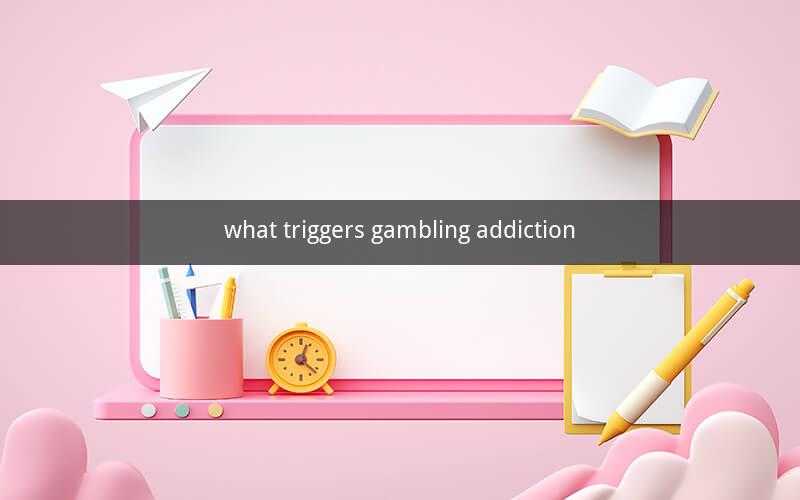
Table of Contents
1. Understanding Gambling Addiction
2. The Role of Biology in Gambling Addiction
3. Environmental Factors Influencing Gambling Addiction
4. Psychological Aspects of Gambling Addiction
5. Societal and Cultural Influences on Gambling Addiction
6. The Signs and Symptoms of Gambling Addiction
7. Diagnosing and Treating Gambling Addiction
8. Preventing Gambling Addiction
9. The Impact of Gambling Addiction on Families and Relationships
10. Conclusion
1. Understanding Gambling Addiction
Gambling addiction, also known as compulsive gambling, is a disorder characterized by an irresistible urge to gamble, despite negative consequences. This addiction can affect individuals of all ages, genders, and socioeconomic backgrounds. Understanding the triggers of gambling addiction is crucial in identifying and addressing the underlying causes.
2. The Role of Biology in Gambling Addiction
Research suggests that biology plays a significant role in the development of gambling addiction. Genetic factors, brain chemistry, and neurotransmitter imbalances have all been identified as potential contributors. For instance, individuals with a family history of addiction may be more susceptible to developing gambling problems.
3. Environmental Factors Influencing Gambling Addiction
Environmental factors also play a crucial role in the development of gambling addiction. Access to gambling venues, exposure to gambling advertisements, and the availability of credit can all increase the risk of developing an addiction. Additionally, individuals who experience stress, anxiety, or depression may turn to gambling as a form of self-medication.
4. Psychological Aspects of Gambling Addiction
Psychological factors, such as low self-esteem, a need for excitement, and a desire to escape reality, can contribute to the development of gambling addiction. Individuals with these psychological vulnerabilities may be more susceptible to the allure of gambling as a means of obtaining instant gratification and relief from negative emotions.
5. Societal and Cultural Influences on Gambling Addiction
Societal and cultural factors can also influence the development of gambling addiction. For example, societies that promote the idea of wealth through gambling may have higher rates of addiction. Additionally, cultural norms and values can shape an individual's attitudes towards gambling and its associated risks.
6. The Signs and Symptoms of Gambling Addiction
Identifying the signs and symptoms of gambling addiction is essential for early intervention. Common signs include preoccupation with gambling, increasing the amount of money and time spent on gambling, lying about gambling activities, and neglecting personal responsibilities.
7. Diagnosing and Treating Gambling Addiction
Diagnosing gambling addiction involves assessing the individual's gambling behavior, history, and the impact of their addiction on their life. Treatment options include therapy, support groups, and medication. Cognitive-behavioral therapy (CBT) is particularly effective in helping individuals develop healthier coping mechanisms and reduce their gambling urges.
8. Preventing Gambling Addiction
Preventing gambling addiction involves a combination of education, awareness, and policy changes. Educating individuals about the risks of gambling, promoting responsible gambling practices, and implementing strict regulations on gambling venues can help reduce the incidence of addiction.
9. The Impact of Gambling Addiction on Families and Relationships
Gambling addiction can have a devastating impact on families and relationships. Financial strain, emotional turmoil, and trust issues are common consequences. It is essential for families to seek support and resources to cope with the challenges associated with gambling addiction.
10. Conclusion
Understanding the triggers of gambling addiction is crucial for addressing the underlying causes and developing effective prevention and treatment strategies. By combining biological, psychological, environmental, and societal factors, we can work towards a healthier and more informed approach to gambling addiction.
Questions and Answers
1. What is the primary cause of gambling addiction?
- The primary cause of gambling addiction is a combination of genetic, psychological, environmental, and societal factors.
2. Can genetics play a role in the development of gambling addiction?
- Yes, genetics can play a role in the development of gambling addiction. Individuals with a family history of addiction may be more susceptible.
3. How can environmental factors contribute to gambling addiction?
- Environmental factors such as access to gambling venues, exposure to gambling advertisements, and the availability of credit can contribute to the development of gambling addiction.
4. What psychological factors can lead to gambling addiction?
- Psychological factors such as low self-esteem, a need for excitement, and a desire to escape reality can contribute to the development of gambling addiction.
5. How can societal and cultural factors influence gambling addiction?
- Societal and cultural factors such as promoting wealth through gambling and cultural norms and values can influence the development of gambling addiction.
6. What are the signs and symptoms of gambling addiction?
- The signs and symptoms of gambling addiction include preoccupation with gambling, increasing the amount of money and time spent on gambling, lying about gambling activities, and neglecting personal responsibilities.
7. How is gambling addiction diagnosed?
- Gambling addiction is diagnosed by assessing the individual's gambling behavior, history, and the impact of their addiction on their life.
8. What are some treatment options for gambling addiction?
- Treatment options for gambling addiction include therapy, support groups, and medication. Cognitive-behavioral therapy (CBT) is particularly effective.
9. How can we prevent gambling addiction?
- We can prevent gambling addiction by educating individuals about the risks of gambling, promoting responsible gambling practices, and implementing strict regulations on gambling venues.
10. What is the impact of gambling addiction on families and relationships?
- Gambling addiction can have a devastating impact on families and relationships, including financial strain, emotional turmoil, and trust issues.